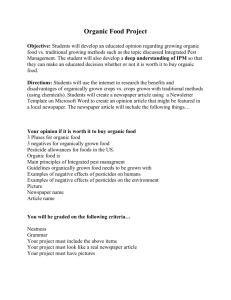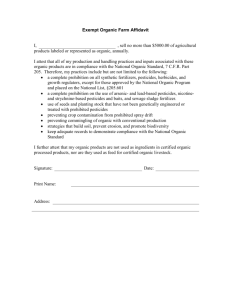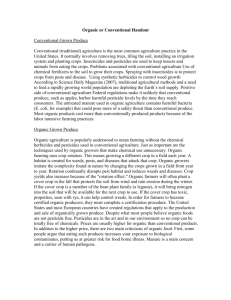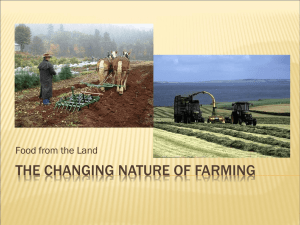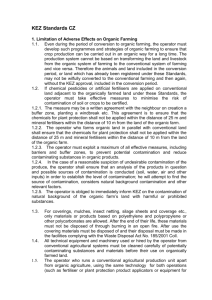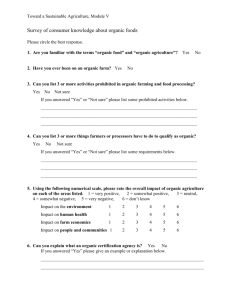IN-Wheeling-Magazine.. - East End Food Co-op
advertisement
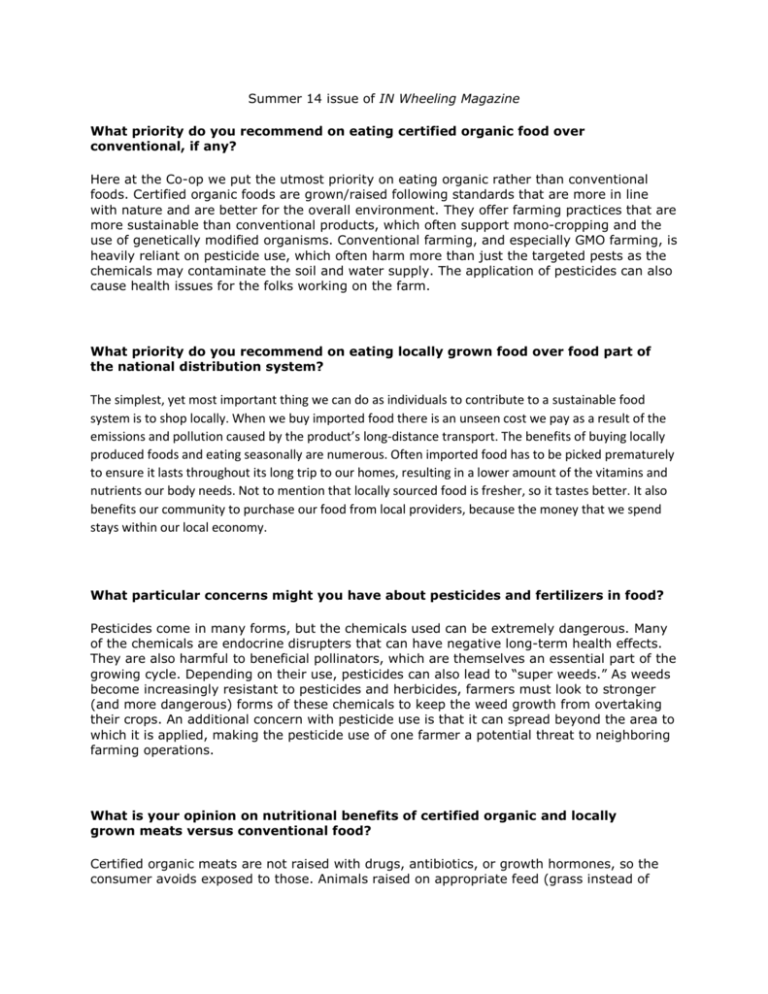
Summer 14 issue of IN Wheeling Magazine What priority do you recommend on eating certified organic food over conventional, if any? Here at the Co-op we put the utmost priority on eating organic rather than conventional foods. Certified organic foods are grown/raised following standards that are more in line with nature and are better for the overall environment. They offer farming practices that are more sustainable than conventional products, which often support mono-cropping and the use of genetically modified organisms. Conventional farming, and especially GMO farming, is heavily reliant on pesticide use, which often harm more than just the targeted pests as the chemicals may contaminate the soil and water supply. The application of pesticides can also cause health issues for the folks working on the farm. What priority do you recommend on eating locally grown food over food part of the national distribution system? The simplest, yet most important thing we can do as individuals to contribute to a sustainable food system is to shop locally. When we buy imported food there is an unseen cost we pay as a result of the emissions and pollution caused by the product’s long-distance transport. The benefits of buying locally produced foods and eating seasonally are numerous. Often imported food has to be picked prematurely to ensure it lasts throughout its long trip to our homes, resulting in a lower amount of the vitamins and nutrients our body needs. Not to mention that locally sourced food is fresher, so it tastes better. It also benefits our community to purchase our food from local providers, because the money that we spend stays within our local economy. What particular concerns might you have about pesticides and fertilizers in food? Pesticides come in many forms, but the chemicals used can be extremely dangerous. Many of the chemicals are endocrine disrupters that can have negative long-term health effects. They are also harmful to beneficial pollinators, which are themselves an essential part of the growing cycle. Depending on their use, pesticides can also lead to “super weeds.” As weeds become increasingly resistant to pesticides and herbicides, farmers must look to stronger (and more dangerous) forms of these chemicals to keep the weed growth from overtaking their crops. An additional concern with pesticide use is that it can spread beyond the area to which it is applied, making the pesticide use of one farmer a potential threat to neighboring farming operations. What is your opinion on nutritional benefits of certified organic and locally grown meats versus conventional food? Certified organic meats are not raised with drugs, antibiotics, or growth hormones, so the consumer avoids exposed to those. Animals raised on appropriate feed (grass instead of corn for cows, for example) and that are allowed to pasture tend to be healthier animals, and that certainly impacts the quality of the meat, as well as its nutritional value. Buying local provides an opportunity to be more aware of the farm that produced the food, to know the farmer, and understand the practices that go into raising the animals, which helps guarantee the animals are well-treated and will be fit for consumption (which is not always the case in factory farms). What is your opinion on nutritional benefits of certified organic and locally grown dairy products versus conventional food? Certified organic dairy cannot come from animals treated with drugs, growth hormones or antibiotics, so again those potentially harmful elements can be avoided by the consumer. Another benefit is that organic dairy products will not contain rBGT, a genetically modified growth hormone that increases milk production in cows, but often increases infection in the animals. As a side note, we also have access to raw milk from local dairies here in Pennsylvania. Though the FDA suggests that raw milk may “harbor dangerous microorganisms that can pose serious health risks” there is still a large number of people who believe raw milk contains more healthful benefits, as a result of not being heated or pasteurized. (Source: http://www.fda.gov/Food/ResourcesForYou/consumers/ucm079516.htm) What is your opinion on nutritional benefits of certified organic and locally grown vegetables versus conventional food? Local food is picked at its peak, which means the fruit/vegetable has had longer to develop. Many experts take this to mean the produce has greater nutritional value. Avoiding chemicals that are sprayed on conventional items is probably best, though people who cannot access organics should not let this dissuade them from eating conventional produce. In the end, some vegetables are better than no vegetables. We recommend sourcing the foods individuals eat the most often organically for shoppers who can’t afford to shop organically for all their commodities. Another shopping guideline for those who can’t go strictly organic, would be to avoid what are known as “The Dirty Dozen” – aka: the produce items most contaminated by the use of pesticides when treated with those chemicals. These include: 1. 2. 3. 4. 5. 6. 7. 8. 9. Apples Celery Sweet bell peppers Peaches Strawberries Nectarines (imported) Grapes Spinach Lettuce 10. Cucumbers 11. Blueberries (domestic) 12. Potatoes (Source: www.ewg.org) An additional note I’d like to add in responding to the above questions: Here at the Co-op, our buying guidelines do give preference to organic items over conventional. But we are also working with a number of reputable farmers who are operating Certified Naturally Grown operations. We think it’s important to distringuish between these types of operations and conventional operations because according to the Certified Naturally Grown organization, their farmers: Don’t use synthetic chemical insecticides, herbicides, fungicides, fertilizers, or GMO seeds. Protect our soil, water, and air with crop rotation, cover crops, and buffer strips. Raise free-range livestock on open pasture. Never use hormones or routine antibiotics on their livestock. Maintain open records of farming practices online. (Source: www.naturallygrown.org) We realize that not all of our local, independent farmers can afford the cost of the organic certification required to carry the organic label. When it comes to farmers lacking the label, but observing sound practices, our buyers work closely with them to become familiar with their operation and confirm they are enlisting sound production methods that are in alignment with our buying policy. Additional Resources: If you’d like to learn more about our buying guidelines, please visit: www.eastendfood.coop/market/grocery In case you need a biographical reference for myself and/or the Co-op, here’s one that was published with a recent LOCAL Pgh article I wrote: Heather Hackett is the Marketing and Member Services Manager at the East End Food Co-op. Located in Point Breeze, the East Food Co-op is Pittsburgh’s only member-owned natural and organic grocery store. Committed to stocking their shelves with the healthiest foods available, the Co-op offers a wide variety of organic and locally-sourced products. Open to everyone, every day from 8 am – 9 pm.
